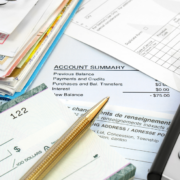Simply ending your Bucks County marriage cannot cause your credit score to drop. The actions you and your spouse take before, during, and after your divorce can cause credit problems in the short term and long into the future. You can mitigate credit damage by reassessing your financial obligations during proceedings, ensuring bills are paid, and separating your financials as soon as possible.
Below, we discuss the connection between divorce and your credit score, as well as tips to limit the fallout.
Be Strategic About Paying Bills
Your credit score after divorce can remain the same as during your marriage as long as you pay your bills on time. Financial separation is crucial during this period, so you (and you alone) are responsible for your bills.
Think about the bills in your name and who pays for them. For example, paying off your credit card each month will remain your responsibility if the account belongs to you alone. Joint assets can create problems for divorcing spouses, especially if they default on a loan.
Say you and your spouse share a home, and both of your names appear on the deed and mortgage. If you move out and don’t pay your share of the mortgage, your credit can suffer because your name is still attached to the loan.
The connection between divorce and lower credit scores often has to do with not paying bills. Whether this is due to stress or lifestyle changes, your credit score might take a hit.
Don’t Take On New Debt
Lawyers often guide couples through the complex process of divorce and debt division. Legal professionals strongly advise against taking on new debt, especially if the asset doesn’t belong to you. This includes:
- Mortgages
- Car payments
- Student loans
- Credit card debt
You could be on the hook for payments that you agreed to during your marriage, especially if you signed as a primary or co-signer for your spouse. For example, if a husband has student loan debt and the wife was a co-signer on that loan, she could become liable for future payments despite a divorce. If she stops paying amid a separation and the husband is not able to pay, then the wife’s credit score could be impacted.
Avoid Joint Account Liability
Perhaps the biggest credit impact of divorce boils down to keeping joint accounts when you’re no longer legally married. Start over by closing these accounts and only using bank or credit card accounts solely in your name. I recommend this step because it helps alleviate certain financial obligations tied to your ex once you officially end the marriage.
Changing your existing account numbers in case your former spouse still has access to them is a good idea. For example, your computer may save one of your credit cards and allow your ex to make purchases on your dime. Changing your account information prevents this, helping you achieve an independent financial future.
Prepare for Your Future With a Professional Divorce Attorney
Mitigate the impact of divorce and your credit score with the help of Karen Ann Ulmer, P.C. Our knowledgeable family lawyers can guide you through proceedings and assist with child custody agreements, alimony, and more.
Call (866) 261-9529 or submit our online booking form to request a consultation – we’re standing by and ready to help.




